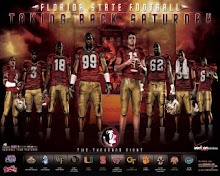
Now that college recruiting is winding down toward National Signing Day on Feb. 6, I had the opportunity to ask Ross Tucker a few questions in regard to college football recruiting. Ross is a Washington Redskins offensive lineman currrently on Injured Reserve and a 6 year NFL veteran. He graduated from Princeton University in 2001. All-Ivy League (2000) and two time Academic All American (1999 & 2000).
Ross is the co-founder of Go Big Recruiting . Thanks again to Ross for answering the questions for FSU It's Time during a busy time of the year.
1. Ross, what is the major way that most college football coaches find those players that they want to recruit?
Most colleges pay recruiting services for their lists of the top prospects in the country as well as the best players in particular areas of the country. Those recruiting companies, and others, attempt to collect information from every high school football coach in the country. Those services effectively do the early leg work for the colleges. Once that data is compiled, the college football coaches begin to target specific players at key positions of need. 95% of Division I caliber players are easily identifiable by their junior year, and many are on the radar as early as their sophomore year. It is more difficult to identify players earlier at the lower levels.
2. FSU like many other schools now has a player personnel staff person that is not a coach but who coordinates recruiting efforts. Does that give schools like FSU a recruiting advantage over schools without that resource?
Almost every Division I school now has a Director of Operations in addition to a Recruiting Coordinator who combine to develop the game plan and coordinate the arduous and time-consuming task of recruiting. Between compiling the lists, targeting specific recruits, watching the game films, and coordinating coaches and official visits, recruiting is a full-time job. Recruiting gets more complicated and its importance increases with every passing year simply because getting the best players is the lifeblood of any college football program. Having a Player Personnel person on staff is not much of an advantage specific to FSU because most of the other schools in the ACC have followed suit.
3. In your opinion. what is the major reason a kid goes to one school over another?
Anyone being recruited by FSU or a school of that ilk has designs and dreams of a potential NFL career. More than ever before, high school prospects pick schools based primarily on what that college can do to increase their chances of playing in the NFL. That could mean that they base their decision on a guarantee of early playing time or a feeling of an early opportunity to play based upon the other players already in the program. Others choose a school because of the system that they run. Terrelle Pryor of Jeannette High School in Pennsylvania is considered the #1 High School player in the country. He recently added Oregon to his list of potential choices because of his desire to run the same system that Dennis Dixon ran with such success this year.
4. What do you see in college football recruiting today that needs to be fixed or modified?
There are two trends in college football recruiting that need to be modified because of the adverse impact they are having on the student-athletes. The first trend is the earlier and earlier recruitment of the top prospects. Sophomores and Juniors in high school are often inundated with mailings and offers and the trend is to begin finding and recruiting these players earlier and earlier. This is a trend that needs to be reversed at some point as 15-year olds are in no position to make a decision as to where they are going to attend college in two and a half years.
The other trend I don't care for is the pressure to commit. Coaches often tell 17-year olds that they need to make a decision by an arbitrary deadline, often giving the prospects very little time to process all of the information before making a decision. This is too much pressure on a 17-year old.
5. We as fans always read that a football player is a four or five star recruit. Do you think the star ratings for high school recruits by the recruiting services is a realistic way to judge the calibre of an athlete?
I think that the star system is a realistic way to judge a prospect based purely on their natural athleticism. The problem is that there is so much that goes into being an outstanding player at the college level. Football intelligence, work ethic, preparation and technique are every bit as important to success at the higher levels of football as natural athleticism. That is why undrafted players end up in the Pro Bowl in the NFL and walk-ons start over four star recruits at the college level. There is more to being an outstanding player in college than a plethora of highlight film plays in high school
Twitter Updates
Friday, December 21, 2007
Q&A With NFL Player Ross Tucker Regarding College Football Recruiting
Posted by
tallynolefan
at
1:44 PM
![]()
Subscribe to:
Post Comments (Atom)







No comments:
Post a Comment